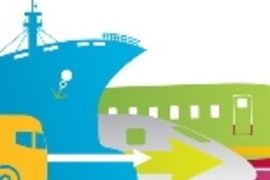The Massachusetts Institute of Technology today launched Transportation@MIT, a coordinated effort to address one of civilization's most pressing challenges: the environmental impact of the world's ever-increasing demand for transportation. Building on MIT's rich tradition of engineering research and interdisciplinary collaboration, the new initiative will knit together the wide-ranging, robust research already under way at the Institute and create new opportunities for education and innovation.
The program's creation comes as the global movement of people and things becomes increasingly unsustainable -- a problem that cannot be pinned on any one mode of transport. Two-thirds of the world's petroleum consumption is taken up by transportation-related needs. Projections indicate that demand for petroleum, if unchecked, may outstrip supply within a few decades, while carbon dioxide output across the globe could triple by 2050.
"The global transportation challenge is as multi-faceted as a problem could be, and it is hard to think of an institution better equipped to tackle it than MIT," said Dean of Engineering Subra Suresh. "By coordinating our own efforts and leveraging connections among faculty across our schools --Â from researchers exploring efficient new fuels to those studying transportation as a system to those rethinking how our cities are organized --Â we can make important and innovative contributions and encourage the rapid development of new ideas in sustainability, technology, business practices, and public policy related to all modes of transportation.
"Our aspiration is nothing less than to pioneer transportation technology and solutions for the twenty-first century," Suresh added. "We must create a sustainable and environmentally friendly transportation ecosystem that can have an impact across the globe."
The coordinated initiative on transportation will be led by Associate Dean of Engineering for Academic Affairs Cynthia Barnhart and will draw on the strengths of three schools at MIT: the School of Engineering, the School of Architecture and Planning, and the MIT Sloan School of Management. The School of Engineering at MIT currently attracts over $20 million in transportation-related sponsored research every year.
"MIT has three distinct advantages in contributing to important global challenges like sustainable transportation," said MIT Sloan Dean David C. Schmittlein. "First, each school within the Institute is more part and parcel of the whole university and so we bring together the varied perspectives needed to improve complex systems. Second, across these schools of MIT we commit ourselves to studying not just narrow issues, but to tackling the world's biggest and most transformational challenges, from energy to cancer to, here, sustainable transportation. Third, our MIT faculty members are simply more committed to innovative ideas that are of practical value. MIT Sloan is proud of its shared leadership in this important new program."
Â
A recent survey of 1,300 MIT faculty and research staff found that researchers across the Institute are conducting research in nearly every area of modern transportation. More than a quarter of those surveyed are working in areas related to transportation, from motor vehicles to urban infrastructure planning to aviation efficiency to adaptive technologies and their influence on personal behavior. MIT researchers also conveyed a broader definition of - and set of approaches to - the issues related to transportation, and the initiative is a way to help them make connections among their respective projects. By addressing the broader issue of sustainable accessibility, rather than focusing on the mechanics of mobility, they will bring a much broader set of challenges, and opportunities for solutions, to the future of transportation research.
"Transportation is clearly a central issue in addressing the world's pressing energy problems, as well as a major concern in the efficient design of cities and regions. As such, it provides a natural focus for interschool initiatives and offers great opportunities for collaborative education and research," said Architecture and Planning Dean Adele Santos.
Transportation@MIT will start as a two-year pilot program with initial support from all three participating schools. Plans are under way for the development of two labs, one in Cambridge and one outside the United States, where researchers can apply and test new processes, technologies and policies.
"MIT must demonstrate leadership in this critically important area -- and we're ready to do so," said Suresh. "We all know the impact of transportation on the environment. Countries all over the world are making major investments in critical transportation infrastructure. We must do what we can to ensure that those investments are sustainable, and our approach must match the scale of the problem. If we act quickly and through a broad range of partnerships, we can make sure that the work we do has the broadest possible impact across the globe."







